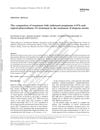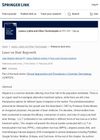 3 citations,
December 2020 in “International Journal of Women's Dermatology”
3 citations,
December 2020 in “International Journal of Women's Dermatology” Scalp micro-wounding helps promote hair growth in female pattern hair loss.
 25 citations,
August 2017 in “Lasers in Medical Science”
25 citations,
August 2017 in “Lasers in Medical Science” Fractional lasers seem effective and safe for treating hair loss, but more research is needed to find the best treatment methods.
 13 citations,
July 2011 in “Journal of Dermatological Treatment”
13 citations,
July 2011 in “Journal of Dermatological Treatment” Clobetasol and pimecrolimus are similarly effective for alopecia areata, but pimecrolimus has fewer side effects and is preferred for long-term use.
 5 citations,
November 2011 in “Expert Review of Dermatology”
5 citations,
November 2011 in “Expert Review of Dermatology” The document concludes that early diagnosis and a comprehensive treatment plan are crucial for managing hair loss in children, with a focus on both medical and psychological support.
 4 citations,
January 2015 in “Endocrinology & metabolic syndrome”
4 citations,
January 2015 in “Endocrinology & metabolic syndrome” Testosterone can cause acne and male-pattern baldness, affects hair growth in men and women, and makes male skin more sensitive.
 November 2020 in “Postepy Dermatologii I Alergologii”
November 2020 in “Postepy Dermatologii I Alergologii” Sulfotransferase SULT1A1 activity may predict minoxidil treatment success for hair loss.
 8 citations,
October 2022 in “Regenerative Therapy”
8 citations,
October 2022 in “Regenerative Therapy” New regenerative treatments for hair loss show promise but need more research for confirmation.
 August 2023 in “International journal of experimental research and review”
August 2023 in “International journal of experimental research and review” There are effective treatments available for baldness.
 1 citations,
November 2021 in “European journal of medical and health sciences”
1 citations,
November 2021 in “European journal of medical and health sciences” Growth factors-rich plasma treatments can significantly speed up wound healing and tissue regeneration.
40 citations,
October 2012 in “Dermatologic clinics” More research is needed to understand the genetic causes of Alopecia areata to develop better treatments.
 January 2017 in “Clinical approaches and procedures in cosmetic dermatology”
January 2017 in “Clinical approaches and procedures in cosmetic dermatology” Low-Level Laser Therapy might be a good alternative for hair loss when other treatments fail, but its effectiveness varies and more research is needed.
 42 citations,
August 2013 in “International Journal of Women's Health”
42 citations,
August 2013 in “International Journal of Women's Health” Female pattern hair loss is caused by multiple factors and while treatments like topical minoxidil, hormone therapy, and low-level light therapy can help, none can fully cure it.
1 citations,
July 2021 in “Acta dermatovenerologica Croatica” Adalimumab significantly improved symptoms and quality of life in two patients with Hidradenitis Suppurativa.
 38 citations,
January 2019 in “International Journal of Women's Dermatology”
38 citations,
January 2019 in “International Journal of Women's Dermatology” The document concluded that more research is needed to find the best treatment for Frontal fibrosing alopecia.
Mesotherapy is more effective and preferred for female hair loss than topical minoxidil.
68 citations,
January 2014 in “Dermatology research and practice” Skin side effects from cancer drugs targeting EGFR can affect treatment adherence but can be managed with antibiotics like tetracycline.
 April 2024 in “Military Medical Research/Military medical research”
April 2024 in “Military Medical Research/Military medical research” Cellular and immunotherapies show promise for healing chronic wounds but need more research.
 January 2018 in “Clinical approaches and procedures in cosmetic dermatology”
January 2018 in “Clinical approaches and procedures in cosmetic dermatology” Low-Level Laser Therapy might be an effective alternative hair loss treatment for some people.
3 citations,
August 2018 in “Therapeutics and Clinical Risk Management” Corticosteroid therapy for alopecia areata can cause severe hip bone damage.
 June 2023 in “Journal of Education, Health and Sport”
June 2023 in “Journal of Education, Health and Sport” CBD is effective for certain epilepsy conditions, shows promise for other health issues, but needs more research for safety and effectiveness.

Hair loss in African American women, caused by hair care, genetics, and environment, needs more research for better treatment.
 8 citations,
January 2020 in “Skin Pharmacology and Physiology”
8 citations,
January 2020 in “Skin Pharmacology and Physiology” Caffeine improves hair growth, thickness, and reduces shedding.
 196 citations,
September 2016 in “JCI insight”
196 citations,
September 2016 in “JCI insight” Ruxolitinib effectively regrows hair in most patients with severe hair loss.
 49 citations,
August 2018 in “International Journal of Dermatology”
49 citations,
August 2018 in “International Journal of Dermatology” Topical JAK inhibitors may help treat alopecia universalis by promoting hair regrowth.
 1 citations,
January 2018 in “Springer eBooks”
1 citations,
January 2018 in “Springer eBooks” Photobiomodulation is an effective and safe treatment for increasing hair growth in people with hair loss.
 47 citations,
April 2016 in “Lasers in Surgery and Medicine”
47 citations,
April 2016 in “Lasers in Surgery and Medicine” Low-level laser therapy may improve hair regrowth and thickness for androgenetic alopecia, but more research is needed.
 11 citations,
December 2018 in “Assay and Drug Development Technologies”
11 citations,
December 2018 in “Assay and Drug Development Technologies” Natural herbal compounds might treat certain medical conditions by reducing DHT levels, but more research is needed to confirm their effectiveness and safety.
 March 2023 in “Seminars in reproductive medicine”
March 2023 in “Seminars in reproductive medicine” PCOS often leads to sleep problems, especially obstructive sleep apnea, affecting overall health.

Topical minoxidil helps treat hair loss in teens, but more research needed for safe options.
 15 citations,
April 2020 in “Journal of The American Academy of Dermatology”
15 citations,
April 2020 in “Journal of The American Academy of Dermatology” Spironolactone effectively treats female pattern hair loss with few side effects.

























